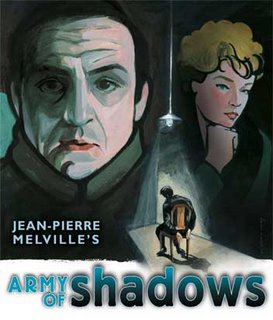
As anyone who’s seen the commercials for Little Man can attest, it shouldn’t be surprising that what will likely be the best film to hit theaters this year was made in the late 60’s. Jean-Pierre Melville’s masterpiece, L'Armée des ombres (Army of Shadows), never made it to the U.S. after it was met with a chilly critical and commercial reception upon it’s 1969 release in France, a reaction that apparently had largely to do with politics at the time. Happily, Mellville’s uncompromising film, which draws on his memories as a fighter in the French Resistence during World War II, looks and feels utterly contemporary, except in the sense that virtually no contemporary film can match it.
This is the third Melville film I’ve seen, following his brilliant neo-noir crime classics, Le Samourai and Le Cercle Rouge. Dripping with minimalist cool, both films fused the atmosphere of classic American gangster pictures with a kind of enigmatic, Eastern sensibility – Le Cercle Rouge even opens with a phony Buddhist proverb. The stoic characters hurtle toward their inevitable tragic fates while observing their own obscure, samurai-like codes of honor. This approach may sound absurd but the director pulls it off masterfully (John Woo, Jim Jarmusch and, as usual, Tarantino have all cited Melville as an influence).
Amazingly, in Army of Shadows, Melville surpasses both films by transferring that same stylized tone - trenchcoats, fedoras and all - onto a World War II film, while adding several layers of depth and characterization in the process. The film mainly focuses on a small group of Resistence fighters led by Phillipe Gerbier (Lino Ventura), an introspective, unassuming source of quiet determination, who’s capable of making any sacrifice to satisfy his convictions. Yet Gerbeir and co. remain deeply human throughout, even while tapping near-inhuman levels of resolve during the film’s most suspensful moments; including one daring, early escape that culminates in a tense sequence in a barbershop. We are also occasionally privy to several characters’ thoughts via voiceovers, but there are no showy gestures or speeches to be found, just a strong aura of fatalism that permeates every action. Joseph Kessel, the resitence fighter and author of the book from which the film is adapted, was reportedly moved to tears by the integrity of the director’s technique. Melville observes everything here with the same realistic, methodical precision he brought to his crime films, while working with a noticeably bigger budget.
The dvd will be out later this year, probably from Criterion, but if at all possible try to catch the restored version in a theater if you can (I believe it’s still playing in DC until Friday and New York currently, with more cities to come) Melville’s technique is so richly cinematic that you are engulfed in the blue tones and shadows on the screen right from the beginning.
Official site from Rialto Pictures.
Read Ebert's "Great Movies" review.
No comments:
Post a Comment